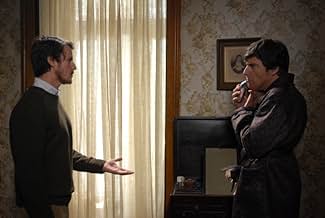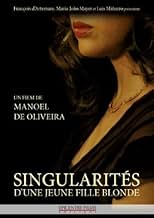IMDb रेटिंग
6.2/10
1.9 हज़ार
आपकी रेटिंग
अपनी भाषा में प्लॉट जोड़ेंA young man falls helplessly in love with a mysterious blonde woman who turns his life upside down.A young man falls helplessly in love with a mysterious blonde woman who turns his life upside down.A young man falls helplessly in love with a mysterious blonde woman who turns his life upside down.
- पुरस्कार
- 3 जीत और कुल 2 नामांकन
फ़ीचर्ड समीक्षाएं
7RNQ
I've given this film a respectful score, if only because it is like being privileged to visit a grande dame in her home, where everything is correct and so boring you want to tell it point by point to your friends, who you hope are aware that you are not boring yourself. And I'd like to suppose the film is similarly ironic about its bland characters (a lover in the Cape Verde Islands who writes out for his young woman their physical geography, as my encyclopedia would call it). Its argument may be about the boring eternity of the upper bourgeoisie even in our world where the same fine things are now paid for in euros. But the film may fall into its own trap, as with the titles that let a conductor go seat by seat in a first-class train car checking tickets while credits very slowly appear. Viewer, your attention might stray to what may be outside the windows, but notice the lady with the pearl necklace, for she will be the perfect audience for this touching story. The best hope for irony might be a poem or two of Pessoa's, even if recited by a distinguished actor in evening dress.
Is this the first movie by a hundred hear old director and is it any good? Clerk Trêpa working in his uncle's office becomes infatuated with the girl with the fan who he sees in the window opposite the one at which he clerks. He meets and wins her with curious ease but his uncle's unexplained opposition sends him off to Cape Verde where he makes a fortune off screen, that he loses equally easily and he finds his new intended has this alarming flaw - that's an hour and we can go home.
The simplicity of the staging and the glowing interior camera-work do contribute atmosphere but the emphasis is all over the place and the characterisations never connect up.
I'm not a great admirer of the films de Olivera made half a century back so I'm not likely to find this piece more than a curiosity. It has the Old Man Film quality of pieces like Huston's THE DEAD or IMMORTAL STORY without being as good.
The simplicity of the staging and the glowing interior camera-work do contribute atmosphere but the emphasis is all over the place and the characterisations never connect up.
I'm not a great admirer of the films de Olivera made half a century back so I'm not likely to find this piece more than a curiosity. It has the Old Man Film quality of pieces like Huston's THE DEAD or IMMORTAL STORY without being as good.
This partly fairytale-like, partly almost surrealist movie is a little gem about gain, loss and regain, about how far one comes in being honest. It is amazing in many respects, as usually with the films of Manoel De Oliveira, and absolutely unique. E.g., the communication between Macário and Luísa takes mostly place between windows. Windows as such are compromises, openings of a wall which separate the inside from the outside, in-between-land that belongs to nowhere. Then the story obviously sets in a noble and stylistically rigid society, possibly in the 19th century, in which the novel had been written. But suddenly you see a computer screen and people paying in Euro. While Ricardo Trêpa, nephew of the director, and Leonor Silveira belong to the director's film-family, Catarina Wallenstein (who has not much to say and nothing special to act) is a true surprise, doubtlessly one of the most beautiful women ever having appeared on the silver screen, yet completely unknown hitherto outside of Portugal.
Despite considering myself a patriot, I recognize that Portuguese cinema is not particularly good when compared to Spanish, French, Italian or British cinema. We simply don't have the capital and people to make movies as good as theirs. As I've said in other reviews I've written, Portuguese cinema ends up focusing on two distinct fields: bad taste comedies with strong popular appeal, and academic, erudite and not infrequently unpalatable films that (almost) never leave the "festival circuit".
The film that brings us here is a small work directed by Manoel de Oliveira, a dean of filmmakers who gained a very good reputation, but who does not seem to have ever achieved international recognition at the height of what he deserved. In fact, and as much as I may sometimes criticize him, and disagree with his style or options, Oliveira was a good director and a man who understood and lived cinema like very few others. And the proof is the fact that he released this film at the age of one hundred years old!
The script is strictly based on a short story by Eça de Queirós, one of the greatest and most notable Portuguese writers, and was conceived as a light romantic comedy. So light that it didn't make me laugh for a single minute! Personally, I see it more as a moral melodrama. What we have here is, basically, the ravaged infatuation of an emaciated, gentle secretary with a young blonde woman who appears to be just as gentle, docile, and characterless as he is. She is the archetype of the ethereal, angelic and apparently perfect woman who, in the 19th century, was well considered for society. He will, by various means, try to make enough fortune for the marriage, even going against his uncle, who had him as an employee in his trading house.
The film is reasonably good. It could be better if it was a little more spirited (it's supposed to be a comedy, right?) and if certain attitudes and mannerisms of the characters had been somewhat updated and modernized. Set in the present days, there is no justification for how those characters talk and behave as if they were in 1850! That whole question around the fan, for example, sounds archaic. What is the young woman who, nowadays, always carries such an object with her? Another situation that doesn't seem credible to me is the whole opening sequence, on the train. I know that train travel is quite likely to lead to strange people starting to talk to each other. However, I think it would be more coherent and credible, for example, for the character to vent what he needs in a bar, after a few drinks. It sounds more up-to-date, and more coherent with the character's posture, who is experiencing a strong personal pain.
The film counts with the participation of a series of good Portuguese actors, with a considerable accolade in theatre, television and cinema. Catarina Wallenstein seems like a good choice for the female lead. She was quite young, and managed to give that little blonde a sweet and docile look. Ricardo Trêpa, grandson of director Oliveira, doesn't seem to have been a bad choice to play the young lover either, even though he is somewhat unknown. Diogo Dória, Luís Miguel Cintra and Leonor Silveira provide welcome support.
Technically, the film bets heavily on cinematography. Oliveira, with a watchful eye, uses camera movements and the framing of the scenes to convey to the audience the feeling of absolute idealization and deification of that blonde girl, for us to see her as her suitor saw her. The film was made in Portugal, of course, and makes good use of the filming locations, as well as the train journey (this is the second time that I have seen a train play such a prominent role in the opening of an Oliveira film). However, it is a film that loses a lot due to its lukewarm pace, the absence of any emotion, the excessively paused narrative and the absolute absence of a soundtrack.
The film that brings us here is a small work directed by Manoel de Oliveira, a dean of filmmakers who gained a very good reputation, but who does not seem to have ever achieved international recognition at the height of what he deserved. In fact, and as much as I may sometimes criticize him, and disagree with his style or options, Oliveira was a good director and a man who understood and lived cinema like very few others. And the proof is the fact that he released this film at the age of one hundred years old!
The script is strictly based on a short story by Eça de Queirós, one of the greatest and most notable Portuguese writers, and was conceived as a light romantic comedy. So light that it didn't make me laugh for a single minute! Personally, I see it more as a moral melodrama. What we have here is, basically, the ravaged infatuation of an emaciated, gentle secretary with a young blonde woman who appears to be just as gentle, docile, and characterless as he is. She is the archetype of the ethereal, angelic and apparently perfect woman who, in the 19th century, was well considered for society. He will, by various means, try to make enough fortune for the marriage, even going against his uncle, who had him as an employee in his trading house.
The film is reasonably good. It could be better if it was a little more spirited (it's supposed to be a comedy, right?) and if certain attitudes and mannerisms of the characters had been somewhat updated and modernized. Set in the present days, there is no justification for how those characters talk and behave as if they were in 1850! That whole question around the fan, for example, sounds archaic. What is the young woman who, nowadays, always carries such an object with her? Another situation that doesn't seem credible to me is the whole opening sequence, on the train. I know that train travel is quite likely to lead to strange people starting to talk to each other. However, I think it would be more coherent and credible, for example, for the character to vent what he needs in a bar, after a few drinks. It sounds more up-to-date, and more coherent with the character's posture, who is experiencing a strong personal pain.
The film counts with the participation of a series of good Portuguese actors, with a considerable accolade in theatre, television and cinema. Catarina Wallenstein seems like a good choice for the female lead. She was quite young, and managed to give that little blonde a sweet and docile look. Ricardo Trêpa, grandson of director Oliveira, doesn't seem to have been a bad choice to play the young lover either, even though he is somewhat unknown. Diogo Dória, Luís Miguel Cintra and Leonor Silveira provide welcome support.
Technically, the film bets heavily on cinematography. Oliveira, with a watchful eye, uses camera movements and the framing of the scenes to convey to the audience the feeling of absolute idealization and deification of that blonde girl, for us to see her as her suitor saw her. The film was made in Portugal, of course, and makes good use of the filming locations, as well as the train journey (this is the second time that I have seen a train play such a prominent role in the opening of an Oliveira film). However, it is a film that loses a lot due to its lukewarm pace, the absence of any emotion, the excessively paused narrative and the absolute absence of a soundtrack.
I am in awe of the director aged over 100 years making such good films. There is indeed something magical about his films--and this one is no different. Windows across a street. People do not call out to the other but only watch each other discretely. There are elegant rooms with candle-lit chandeliers. Possibly the chandeliers are lit with dozens of bulbs that look like candles (or are they real candles)?. There are no sounds of vehicles or electrical switches in camera vision. Yet the décor of the modest cloth shop is 21st century. Euro is the currency and there is a mention of a Portuguese airline, and there is a LED computer screen. The film begins and ends on a modern train compartment. For de Oliveira, time can be switched within the film.
Books, libraries, history, music played indoors to a select audience indicate a sophistication with the matching indoor décor. The conversations are graceful while the story does include mentions of loss of many handkerchiefs from the shop and the stealing of a diamond ring. When the stolen item is paid for, the resulting conversation is most elegant and spoken without raised voices. Add to this, the few Oliveira films I have seen use music only when required. Most contemporary directors cannot conceive such films. That's the magic of the de Oliveira at 100 plus years. The film will be recalled for its style and less for its tale that expects the viewer to suspend belief in logic.
The casting of the main characters is a delight. Ricardo Trepa as Macario, the beautiful Catarina Wallenstein as Luisa, and Leanor Silveira as the middle aged woman on the train. The film reminds you of the décor of Raul Ruiz' "The Mysteries of Lisbon" but that film was not set in the time when Euro was a currency of Portugal.
Books, libraries, history, music played indoors to a select audience indicate a sophistication with the matching indoor décor. The conversations are graceful while the story does include mentions of loss of many handkerchiefs from the shop and the stealing of a diamond ring. When the stolen item is paid for, the resulting conversation is most elegant and spoken without raised voices. Add to this, the few Oliveira films I have seen use music only when required. Most contemporary directors cannot conceive such films. That's the magic of the de Oliveira at 100 plus years. The film will be recalled for its style and less for its tale that expects the viewer to suspend belief in logic.
The casting of the main characters is a delight. Ricardo Trepa as Macario, the beautiful Catarina Wallenstein as Luisa, and Leanor Silveira as the middle aged woman on the train. The film reminds you of the décor of Raul Ruiz' "The Mysteries of Lisbon" but that film was not set in the time when Euro was a currency of Portugal.
क्या आपको पता है
- ट्रिवियाRicardo Trêpa is the director's grandson
टॉप पसंद
रेटिंग देने के लिए साइन-इन करें और वैयक्तिकृत सुझावों के लिए वॉचलिस्ट करें
विवरण
- रिलीज़ की तारीख़
- कंट्री ऑफ़ ओरिजिन
- भाषा
- इस रूप में भी जाना जाता है
- Eccentricities of a Blonde-Haired Girl
- फ़िल्माने की जगहें
- उत्पादन कंपनियां
- IMDbPro पर और कंपनी क्रेडिट देखें
बॉक्स ऑफ़िस
- बजट
- $25,00,000(अनुमानित)
- दुनिया भर में सकल
- $2,17,014
- चलने की अवधि
- 1 घं 4 मि(64 min)
- रंग
- ध्वनि मिश्रण
- पक्ष अनुपात
- 1.66 : 1
इस पेज में योगदान दें
किसी बदलाव का सुझाव दें या अनुपलब्ध कॉन्टेंट जोड़ें





























